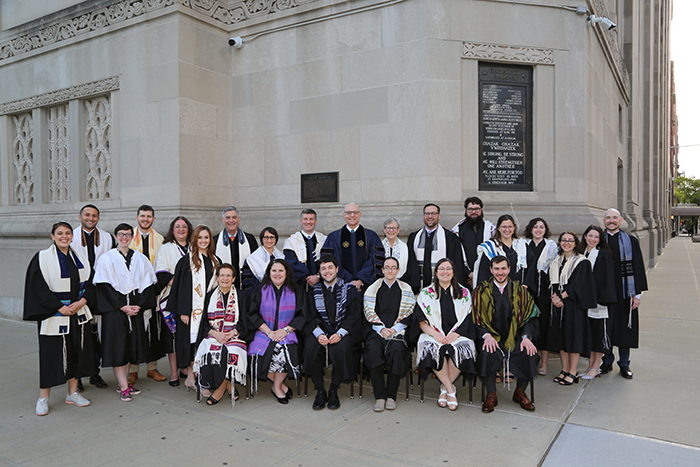
HUC President Andrew Rehfeld (center) and NY Rabbinical and Ordination Class of 2021.
Photo: HUC-JIR/Richard Lobell
This month we celebrate the graduations and ordinations of a new class of our Jewish future: rabbis, cantors, educators, and non-profit leaders, newly ready to take on the challenges of the 21st century and foster our communities to be vital centers of learning, engagement, and identity building. And this year, with vaccinations and Covid-precautions, HUC-JIR is able to be back in person, as we ordain 35 new rabbis and cantors to join our more than 4,000 alumni who have sustained lives and congregations beset by the pandemic.
As our faculty, Board, and administration confer the legal and formal authority upon a new class of rabbis and cantors in Israel, our newest alumni gain tremendous social power among those who now project onto them a sense of holiness and the presence of clergy. With this social power, they will bring comfort to those who are suffering, joy to those who are celebrating, wisdom to those seeking understanding, and beauty to those whom they will elevate through prayer and song. And they will use that social power to strengthen the Jewish People and bring justice and righteousness to our entire world.
These rabbis and cantors have formed as clergy during one of the most challenging periods in HUC’s and our world’s history, demonstrating a remarkable fortitude and resilience that will allow them to meet any challenge with great success. You will greet these new leaders with great faith in their abilities, but it will take more than your faith for them to be successful. Your confidence in them will develop over time, as they do what they have done so well at HUC: face each challenge with courage, wisdom, and determination.
The social power carried by the title “Rabbi” or “Cantor” brings with it great responsibility, with the expectation that these leaders should comport to the highest ethical conduct dictated by our Jewish tradition. But it takes more than just good intentions to achieve righteousness and justice, particularly when a person’s self-interest is involved. It takes a structure of rules and processes, so long as they and their institutions follow them.
I am reminded of the particular steps that Moses took in Numbers 13, when he was about to receive the report of the 12 scouts he had sent into the land of Canaan to see how best to take it. Imagine the moment that should have been the crowning achievement of the life of this man of great privilege, who was finally on the verge of achieving the political glory of establishing a territorially sovereign people.
But the scouts had mostly discouraging news to share. Had Moses acted only in his interests of pursuing glory, he might have ensured that the scouts’ report was presented to him privately to bury any bad news. But that’s not how Moses structured the report. Though there is some disagreement about this among our commentators, Moses chose transparency instead: he made sure that the spies delivered their report in the presence of the entire community. While that transparency allowed fear to spread like wildfire among the people, it helped Moses see that the people themselves were not going to be successful if they tried. Transparency thus constrained Moses’s passions and self-interest…that might have even caused the destruction of the Jewish People.
Transparency is just one of many ethical practices and rules that constrain power. The belief that even the small rules don’t apply to us, that our good intentions can overcome self-interest, and that our emotions and passions are the sources of moral judgment, are the moments when those who have social power begin to abuse it.
Rules are not always just, and you will work hard with your clergy to change those that are unjust. But I still have faith that our graduates will recognize the importance of following them as a path to living a just life. Because these rules don’t just check inappropriate action, they lead to the majesty and righteousness that flows from religious life itself.
- Think of what your communities inspire as you partner with our rabbis and cantors:
- Taking on the discipline of regular study and prayer;
- Participating in the practice of giving tzedakah to the poor and visiting the sick;
- Honoring Shabbat and celebrating the holidays.
It is through these conditioned practices of engaging with our tradition that we attain lives, well lived, in service to others and our entire world.
As for the Class of 2021 / 5781, I have not merely faith, I have confidence that their words and music will touch the souls of your communities, bringing meaning to multitudes and infusing our world with tzedek, chesed, and bina, justice, kindness, and understanding.
So thank you for your sacred partnership with them. For through this work we will achieve Tov v’Kadosh, Yafeh, Nachon v’Tzadok: the Good and the Sacred, the Beautiful, the Right and the Just.
Related Posts

Setting Your Leaders Up For Success

Safety, Equity, and Accountability is the Path to a Thriving Jewish Community
